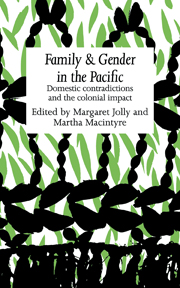Book contents
- Frontmatter
- Contents
- List of contributors
- Acknowledgements
- Map of main island groups of the Pacific
- Map of Papua New Guinea – Provinces
- Introduction
- 1 New England missionary wives, Hawaiian women and ‘The Cult of True Womanhood’
- 2 Changes in the lives of ordinary women in early post-contact Hawaii
- 3 Domestic structures and polyandry in the Marquesas Islands
- 4 The object lesson of a civilised, Christian home
- 5 Medical care and gender in Papua New Guinea
- 6 Suffer the children: Wesleyans in the D'Entrecasteaux
- 7 Women in contemporary Central Enga society, Papua New Guinea
- 8 Better homes and gardens
- 9 God, ghosts and people: Christianity and social organisation among Takuru Wiru
- 10 Sins of a mission: Christian life as Kwaio traditionalist ideology
- 11 Sacred spaces: churches, men's houses and households in South Pentecost, Vanuatu
- 12 Bond-slaves of Satan: Aboriginal women and the missionary dilemma
- Bibliography
- Index
6 - Suffer the children: Wesleyans in the D'Entrecasteaux
Published online by Cambridge University Press: 05 November 2011
- Frontmatter
- Contents
- List of contributors
- Acknowledgements
- Map of main island groups of the Pacific
- Map of Papua New Guinea – Provinces
- Introduction
- 1 New England missionary wives, Hawaiian women and ‘The Cult of True Womanhood’
- 2 Changes in the lives of ordinary women in early post-contact Hawaii
- 3 Domestic structures and polyandry in the Marquesas Islands
- 4 The object lesson of a civilised, Christian home
- 5 Medical care and gender in Papua New Guinea
- 6 Suffer the children: Wesleyans in the D'Entrecasteaux
- 7 Women in contemporary Central Enga society, Papua New Guinea
- 8 Better homes and gardens
- 9 God, ghosts and people: Christianity and social organisation among Takuru Wiru
- 10 Sins of a mission: Christian life as Kwaio traditionalist ideology
- 11 Sacred spaces: churches, men's houses and households in South Pentecost, Vanuatu
- 12 Bond-slaves of Satan: Aboriginal women and the missionary dilemma
- Bibliography
- Index
Summary
The saving of the children is a special feature of the work in this district. It is costly, but it pays…
(AMMR, 4 March 1907:6)Why did the Wesleyan mission in New Guinea devote itself with such fervour to saving the children? This chapter offers further reflections on a number of themes I entertained in an earlier essay, ‘A Tropology of the Dobu Mission’ (1980), in which I examined several dominant metaphors of evangelical rhetoric. I concluded as follows:
If in its earliest phase the Mission sought to gain the ownership of the means of social reproduction (‘get hold of the girls’ and ‘rescue the children’), it was ultimately a self-defeating aim. Inspired rhetorical tropes which countermanded the Dobuan familial order in favour of a Mission ideal of Christian kinship, did not, in the long run, spell the death of Dobuan society – for it flourishes still. But they surely did create considerable mischief for a time by setting the children against the parents.
(Young 1980:103)Here I hope to give greater substance to these claims.
Since we cannot know in precise detail what the family systems of pre-contact New Guinea societies were like we are required to exercise historical and anthropological imagination. There is, however, a great amount of detailed information about early missions provided by themselves and written largely for themselves. Here we are required to exercise also a sociological imagination in discounting prejudices, snaring preconceptions, and generally peering through the screen of mystifications which all religious sects erect, wittingly or not, to protect their particular truths.
- Type
- Chapter
- Information
- Family and Gender in the PacificDomestic Contradictions and the Colonial Impact, pp. 108 - 134Publisher: Cambridge University PressPrint publication year: 1989
- 4
- Cited by



